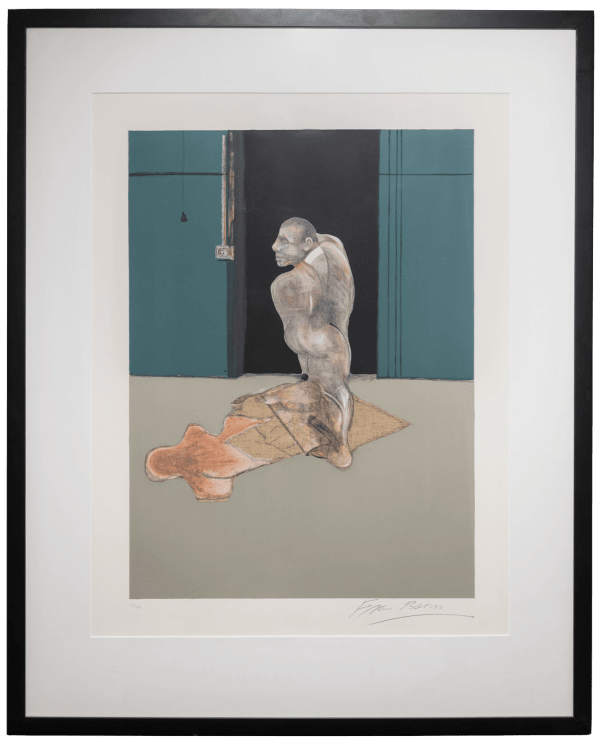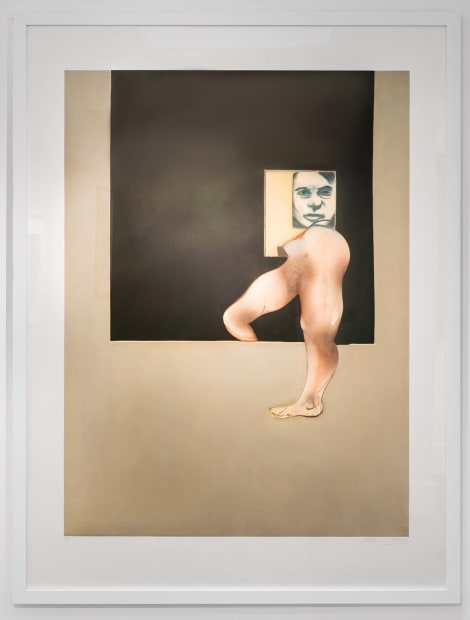-
Dellasposa Gallery is delighted to present Bacon/Freud, an exhibition of works by Modern British artists Francis Bacon and Lucian Freud.
Showcasing the artists' unique and innovative approach to portraiture and figuration, the exhibition captures the complexities of the human form and psyche explored through both artists' raw, visceral, and emotionally charged works. In post-war London, a new avant-garde emerged from the rubble of the city that had experienced a profound impact on its physical and cultural landscape. WWII had brought a sense of loss, trauma, and a desire for renewal that influenced the artistic expressions of the post-war period. Chief among these 'School of London' artists was Francis Bacon and Lucian Freud, who were determinedly figurative artists; they did not share the same imperative the break free from the influences of their artistic predecessors, just as Abstract Expressionism - exemplified by Jackson Pollock and Willem de Kooning's expressive and non-representational qualities - were ascendence in America.
-

-
Each artist's approach to portraiture could hardly have been more different, with Freud working from life from a sitter directly before him for weeks on end in delicate, finely applied strokes and Bacon preferring to work impulsively from photographs in thick swathes of violently contrasting colour. While both Bacon and Freud delved into the psychological aspects of their subjects, their interests and techniques differed. Bacon's work tended to emphasise the emotional and existential aspects of the human condition, often conveying a sense of anguish and existential angst. Meanwhile, Freud focused more on the psychological intimacy between the sitter and the artist, exploring the complexities of human relationships and the vulnerability of the individual.
-
-
![Francis Bacon Trois études de dos d'homme [Three studies of the male back], 1987](data:image/gif;base64,R0lGODlhAQABAIAAAAAAAP///yH5BAEAAAAALAAAAAABAAEAAAIBRAA7) Francis BaconTrois études de dos d'homme [Three studies of the male back], 1987£ 18,500 + ARR
Francis BaconTrois études de dos d'homme [Three studies of the male back], 1987£ 18,500 + ARR -
 Francis BaconStudy for a portrait of John Edwards, 1986
Francis BaconStudy for a portrait of John Edwards, 1986 -
![Francis Bacon Trois études de dos d'homme [Three studies of the male back], 1987](data:image/gif;base64,R0lGODlhAQABAIAAAAAAAP///yH5BAEAAAAALAAAAAABAAEAAAIBRAA7) Francis BaconTrois études de dos d'homme [Three studies of the male back], 1987£ 18,500 + ARR
Francis BaconTrois études de dos d'homme [Three studies of the male back], 1987£ 18,500 + ARR -
 Francis BaconStudy for a portrait of John Edwards, 1986
Francis BaconStudy for a portrait of John Edwards, 1986
-
-
Lucian Freud came to etching as a draughtsman. His natural observation of textures, surfaces, and attention to detail within the constraints of a sophisticated line translated well to etching. The sincerity with which he examined the human form and physicality of flesh realised in his paintings informed his etchings, becoming an extension of the artist's work as a painter. Freud developed a way of conveying a sense of suppleness in his etchings by using small areas of hatched shading and outlines that are softened by repetition. By conceiving his etchings in terms of loosely associated lines that apply the breadth and freedom of a loaded brush, Freud brought to his prints much of the power of his paintings: 'I want to do paintings with the etching process', he stated.
-

-

-
The primary element in Francis Bacon's work was the human figure: the man whose face is in motion, in the grip of a thousand daily cataclysms, which he had the talent to transfigure into one essential, enduring moment through art. The portrait occupies primordial importance within in work. What fascinated Bacon above and beyond appearance, what reinforced his artistic practice, was the essence of a person. He preserved enough resemblance to recognise his model while avoiding everything obstructing the authentic creation. Rejecting direct representation to achieve a new sense of reality without renouncing the essential features of one's appearance was the manner he sought to observe in his portraits.The oscillation between faithfulness to likeness and the demand for an independent reality finds the point of equilibrium in Bacon's work that André Malreaux wrote, 'Every great figurative work makes reference to what it represents, and becomes a work of art through what separates the two.' 'My painting', said Bacon, 'only aims to make life more intense.' He would also say that a real work of art 'opens the valves of feeling.' Art is there to open the 'valves' one keeps firmly closed within ourselves, thus limiting our visions and possibilities and revealing new horizons.
-

Bacon/Freud
Past viewing_room



![Francis Bacon Trois études de dos d'homme [Three studies of the male back], 1987](https://artlogic-res.cloudinary.com/w_600,c_limit,f_auto,fl_lossy,q_auto/artlogicstorage/dellasposa/images/view/962f844f2c7baddabcc8acc22b557fe1p/dellasposa-francis-bacon-trois-tudes-de-dos-d-homme-three-studies-of-the-male-back-1987.png)

![Francis Bacon Trois études de dos d'homme [Three studies of the male back], 1987](https://artlogic-res.cloudinary.com/w_600,c_limit,f_auto,fl_lossy,q_auto/artlogicstorage/dellasposa/images/view/f4076261bab4a6445db5c5ac129864a5p/dellasposa-francis-bacon-trois-tudes-de-dos-d-homme-three-studies-of-the-male-back-1987.png)










